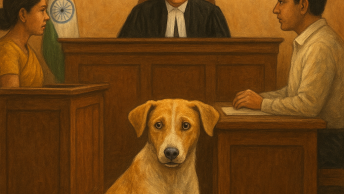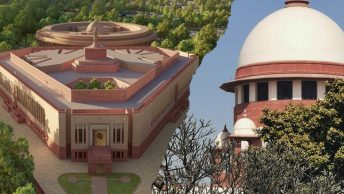The recent controversy surrounding Arvind Kejriwal’s refusal to resign as Chief Minister of Delhi, despite his arrest in a liquor policy case under the PMLA, has brought the concept of effective governance into sharp focus. Even while in jail, Kejriwal continues to oversee the administration of Delhi, a situation compounded by the detention of several of his ministers, including the Deputy Chief Minister. Despite writ petitions/PILs seeking his removal, both the Delhi High Court and the Supreme Court have dismissed these petitions, with the latter suggesting that any action should be taken by the Lieutenant Governor (“LG”).
In the Delhi High Court, two public interest litigations (“PILs”) [Vishnu Gupta v UOI and Surjit Singh Yadav v UOI] and one writ petition [Sandeep Kumar v Arvind Kejriwal] were filed, bringing into focus the question as to how the governance of Delhi was to be conducted while the Chief Minister remains in jail. In the PILs, it was argued that if Kejriwal is guilty of constitutional breach of trust, he has no business to continue in the post of Chief Minister. The writ petition sought the issuance of a writ of quo warranto against Kejriwal. It further prayed that after an inquiry, Kejriwal be dislodged from the office of the Chief Minister of Delhi, if appropriate. “Right to have a government in accordance with the Constitution is a Constitutional Right of every citizen and voter. The Petitioner is an electorate/voter/citizen of NCT of Delhi and therefore he has a constitutional right to have a government as provided by the Constitution and anything otherwise violates his Constitutional Right to have a representative government with the Chief Minister at the head of the Council of Ministers to aid and advise the Lieutenant Governor (Article 239AA(4))”, the plea stated.
In dismissing these petitions, the High Court took the consistent position that there is no legal bar to the Chief Minister continuing to hold office of Chief Minister while being in jail. The High court’s view also rested on the principle of ‘separation of powers’ and ‘comity’. The Court observed that there is no scope for judicial review over the relationship between the LG and the Chief Minister. It further imposed heavy costs on the writ petitioner Sandeep Kumar before it. In our opinion, the legal stance adopted by the Delhi High Court as well as the Supreme Court lost sight of the broader issues of constitutional morality, constitutional propriety and effective governance that the current unconstitutional state of affairs gives rise to. While the Delhi High Court was right in stating that it does not administer the state, we submit that the Court nonetheless has an obligation to ensure that it steps in when there is a complete breakdown of the existing constitutional machinery.
The concept of effective governance, recently explored at length by constitutional law scholars Vicki C. Jackson and Yasmin Dawood in their book ‘Constitutionalism and a Right to Effective Government?’ can serve as a useful analytical framework through which to analyse the current situation. Specifically, one conception of this right to effective government, as discussed by the authors of this book, implies the “duty” owed by members of the government – legislative, executive, and judicial – to act so as to promote effective governance. As the authors note, having an effective government is both a precondition to and purpose of constitutionalism. They note: “effective government can be thought of as a principle or a value running through understandings of constitutional rights, duties, and structures. A purpose of a constitution and thus of constitutionalism is to provide a suitable framework for the effective performance of government functions. But if effective government is both a precondition for and a purpose of constitutionalism, a perhaps more-embracing way to think of effective government is as a “principle” of constitutionalism that is both precondition and purpose.”
In the case of Kejriwal, his ability to govern effectively from jail is highly questionable. The physical and moral challenges of administering a state from behind bars undermine the principles of effective governance. Moreover, as an undertrial, Kejriwal is restricted from issuing orders, and the secrecy of government operations is compromised under prison scrutiny. The LG of Delhi, constitutionally obliged to ensure the state’s governance, has failed to address this unprecedented constitutional crisis of an absence of a Chief Minister and a functional cabinet. Similarly, the inaction of the Union Government has implicitly endorsed a situation where bureaucrats and the LG substitute a democratically elected government, leading to a prolonged policy and governance paralysis in Delhi. The upshot of this cross fire between the inactive Union Government and a paralysed Chief Minister is that the citizens of Delhi have been left in the lurch.
Worse still, the Supreme Court’s conditional interim bail to Kejriwal, which expired on June 2, prevented him from accessing his office or signing official files without the LG’s approval. This interim bail stripped Kejriwal of his functional capacity as Chief Minister. The Supreme Court missed a significant opportunity to address this constitutional impasse. It is admittedly not the job of courts to get into a political thicket. Equally, however, courts cannot be mute spectators to a situation which is contrary to constitutional principles, that is brought to their attention. Taking action does not necessarily require the court to take sides or become partisan. Specifically, the court in the instant case should have guided both the LG and the Union Government on their responsibilities to ensure constitutionally effective governance. The role of constitutional courts like the Supreme Court of India, set up to subserve and to foster values underlying the Constitution, and mandated to provide the constitutionally correct way forward for dealing with democratic dysfunction of whatever form or shape, should not be impeded by formalistic considerations. Rather, the court must demonstrate the capacity to forge new tools to engage with unprecedented situations. For one thing, the Supreme Court should have seen through the disguised inaction on the part of the Union Government as an imperceptible and insidious strategy to superimpose administration by an unelected bureaucracy on the citizens of Delhi. The Court should have exhibited attentiveness to the barriers to governance and administration of Delhi posed by the impasse, and called on the competent authorities to resolve them in a spirit of, to use a phrase sometimes deployed by the Chief Justice of India, robust constitutional statesmanship.
Rahul Bajaj is a practising lawyer in Delhi. Dr. Jain is a professor of law at NLSIU, Bengaluru. Views are strictly personal and must not be attributed to any organization.
Ed Note: This article has been edited by Sukrut Khandekar and published by Harshitha Adari from the Student Editorial Team.





